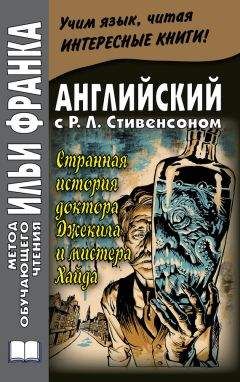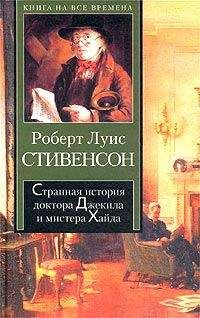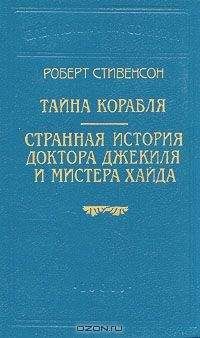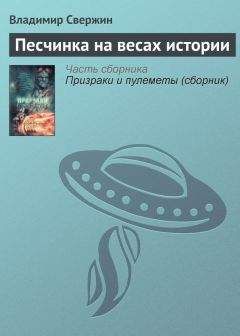Robert Stevenson - Английский язык с Р. Л. Стивенсоном. Странная история доктора Джекила и мистера Хайда
blameless ['bleImlIs] apprehension ["xprI'henS(q)n] gratitude ['grxtItju:d] avoid [q'vOId]
His past was fairly blameless; few men could read the rolls of their life with less apprehension; yet he was humbled to the dust by the many ill things he had done, and raised up again into a sober and fearful gratitude by the many that he had come so near to doing, yet avoided. And then by a return on his former subject, he conceived a spark of hope.
"This Master Hyde, if he were studied (у этого мистера Хайда, при ближайшем рассмотрении; to study — изучать, исследовать; рассматривать)," thought he, "must have secrets of his own (должны найтись и собственные секреты): black secrets, by the look of him (ужасные секреты, судя по его виду; black — черный; страшный, зловещий); secrets compared to which poor Jekyll's worst would be like sunshine (секреты, по сравнению с которыми самые худшие тайны бедного Джекила покажутся солнечным светом). Things cannot continue as they are (так больше продолжаться не может: «вещи не могут продолжаться такими, как они есть»; thing— вещь; дело, событие, явление). It turns me cold to think of this creature stealing like a thief to Harry's bedside (меня просто в холод бросает, как подумаю, как это существо крадется, словно вор, к постели Гарри; tosteal— воровать; делать что-либо незаметно, украдкой); poor Harry, what a wakening (бедный Гарри, что за пробуждение /ждет его/)! And the danger of it (а какая опасность)! for if this Hyde suspects the existence of the will (ведь если этот Хайд заподозрит о существовании завещания), he may grow impatient to inherit (он может проявить нетерпение /и захочет побыстрее/ получить наследство: «может стать нетерпеливым получить наследство»). Ah, I must put my shoulder to the wheel (ах, я просто обязан вмешаться: «приложить мое плечо к колесу /чтобы сдвинуть увязшую телегу/»; shoulder— плечо; wheel— колесо) — if Jekyll will but let me (если только Джекил мне позволит)," he added (добавил он), "if Jekyll will only let me (если только Джекил позволит мне)." For once more he saw before his mind's eye (так как снова он увидел своим мысленным взором), as clean as a transparency (с четкой очевидностью: «столь же отчетливо, как прозрачность»), the strange clauses of the will (странные условия того завещания; clause — статья, пункт, условие; параграф, пункт; оговорка, клаузула /договорного документа/).
creature ['kri:tSq] continue [kqn'tInju:] wakening ['weIk(q)nIN] existence [Ig'zIst(q)ns] impatient [Im'peIS(q)nt] inherit [In'herIt] transparency [trxn'spxrqnsI]
"This Master Hyde, if he were studied," thought he, "must have secrets of his own: black secrets, by the look of him; secrets compared to which poor Jekyll's worst would be like sunshine. Things cannot continue as they are. It turns me cold to think of this creature stealing like a thief to Harry's bedside; poor Harry, what a wakening! And the danger of it! for if this Hyde suspects the existence of the will, he may grow impatient to inherit. Ah, I must put my shoulder to the wheel —if Jekyll will but let me," he added, "if Jekyll will only let me." For once more he saw before his mind's eye, as clean as a transparency, the strange clauses of the will.
III. DR. JEKYLL WAS QUITE AT EASE
(Доктор Джекил был совершенно спокоен)
A FORTNIGHT LATER, by excellent good fortune (две недели спустя по /отличному/ счастливому стечению обстоятельств), the doctor gave one of his pleasant dinners to some five or six old cronies (доктор /Джекил/ устроил один из своих славных обедов пяти-шести своим старым закадычным друзьям; crony— близкий, закадычный друг), all intelligent reputable men, and all judges of good wine (все они были людьми умными и почтенными, и /к тому же/ ценителями отличного вина; judge— судья; ценитель, знаток); and Mr. Utterson so contrived that he remained behind after the others had departed (и мистер Аттерсон устроил все таким образом, что задержался после того, как все другие /гости/ ушли; tocontrive— изобретать; придумывать). This was no new arrangement (это не было необычным: «необычным устроением»; arrangement— приведение в порядок; мера, мероприятие, приготовление; соглашение), but a thing that had befallen many scores of times (такое случалось очень много раз;tobefall— приключаться, происходить, случаться, совершаться). Where Utterson was liked, he was liked well (там, где Аттерсона любили, его любили от всей души; well— хорошо; очень, весьма).
fortnight ['fO:tnaIt] excellent ['eks(q)lqnt] crony ['krqunI] contrived [kqn'traIvd]
A FORTNIGHT LATER, by excellent good fortune, the doctor gave one of his pleasant dinners to some five or six old cronies, all intelligent reputable men, and all judges of good wine; and Mr. Utterson so contrived that he remained behind after the others had departed. This was no new arrangement, but a thing that had befallen many scores of times. Where Utterson was liked, he was liked well.
Hosts loved to detain the dry lawyer (хозяева любили задержать = попроситьостаться сдержанного = суховатого нотариуса), when the light-hearted and the loose-tongued had already their foot on the threshold (когда беспечные и болтливые /гости/ уже переступали порог: «уже имели свою ногу на пороге»; loose — отвязанный, распущенный; tongue — язык); they liked to sit awhile in his unobtrusive company, practising for solitude (им нравилось посидеть какое-то время в его скромной/ненавязчивой компании, готовясь к одиночеству; to practice — тренироваться; obtrusive — выдающийся, выступающий; навязчивый, назойливый, бесцеремонный), sobering their minds in the man's rich silence (отрезвляя/успокаивая свои мысли в его полном глубокого смысла молчании; to sober — отрезвлять; остывать, успокаиваться; rich — богатый; неисчерпаемый, глубокий), after the expense and strain of gaiety (после нагрузки и переутомления веселья; expense — расход, трата; strain — натяжение; растяжение; напряжение; нагрузка; переутомление). To this rule, Dr. Jekyll was no exception (доктор Джекил не был исключением из этого правила); and as he now sat on the opposite side of the fire (и вот, когда теперь он сидел с противоположной стороны камина) — a large, well-made, smooth-faced man of fifty (крупный, хорошо сложенный, чисто выбритый мужчина лет пятидесяти), with something of a slyish cast perhaps, but every mark of capacity and kindness (с, пожалуй, несколько хитрым выражением, но уж точно со всеми признаками ума и доброты; cast — бросок; взгляд, выражениеглаз; mark — знак, признак, показатель; capacity — емкость, объем; умственныеспособности) — you could see by his looks that he cherished for Mr. Utterson a sincere and warm affection (по его виду было ясно, что он питал к мистеру Аттерсону искреннюю и теплую привязанность; to cherish — лелеять; высокоценить, дорожить).
loose-tongued ["lu:s'tANd] threshold ['TreS(h)quld] unobtrusive ["Anqb'tru:sIv]
Hosts loved to detain the dry lawyer, when the light-hearted and the loose-tongued had already their foot on the threshold; they liked to sit awhile in his unobtrusive company, practising for solitude, sobering their minds in the man's rich silence, after the expense and strain of gaiety. To this rule, Dr. Jekyll was no exception; and as he now sat on the opposite side of the fire —a large, well-made, smooth-faced man of fifty, with something of a slyish cast perhaps, but every mark of capacity and kindness — you could see by his looks that he cherished for Mr. Utterson a sincere and warm affection.
"I have been wanting to speak to you, Jekyll (я давно хотел поговорить с вами, Джекил)," began the latter (начал Аттерсон; latter — зд. последнийиздвухназванных, второй). "You know that will of yours (вы знаете, о том вашем завещании)?"
A close observer might have gathered that the topic was distasteful (внимательный наблюдатель мог бы заметить, что тема эта доктору неприятна; close — близкий; тщательный; to gather — собирать; делатьвывод, приходитькзаключению; distaste — отвращение; неприязнь); but the doctor carried it off gaily (но доктор и глазом не моргнул и ответил весело; to carry off — зд. разг. выдерживать). "My poor Utterson (мой бедный Аттерсон)," said he, "you are unfortunate in such a client (не повезло вам с таким клиентом; unfortunate — несчастный; неудачный). I never saw a man so distressed as you were by my will (я никогда не видел никого столь встревоженным, каким были вы из-за моего завещания); unless it were that hide-bound pedant, Lanyon (за исключением того узколобого педанта, Лэньона; hide-bound — сильноистощенный; ограниченный, сузкимкругозором; hide — хайд, наделземли; мераземельнойплощади/= 100 акрам/; bound — связанный, несвободный, ограниченный), at what he called my scientific heresies (который /встревожился/ из-за моих, как он выразился, научных ересей). O, I know he's a good fellow (о, я знаю, что он хороший малый) — you needn’t frown (не надо, не хмурьтесь: «вам не нужно хмуриться») — an excellent fellow (отличный малый), and I always mean to see more of him (и я по-прежнему хочу/собираюсь часто с ним встречаться); but a hide-bound pedant for all that (и все же, несмотря на это — узколобый педант); an ignorant, blatant pedant (невежественный, очевидный педант; blatant — вульгарный, крикливый; очевидный, явный, вопиющий). I was never more disappointed in any man than Lanyon (я ни в одном человеке = ни в ком не был так разочарован, как в Лэньоне)."




